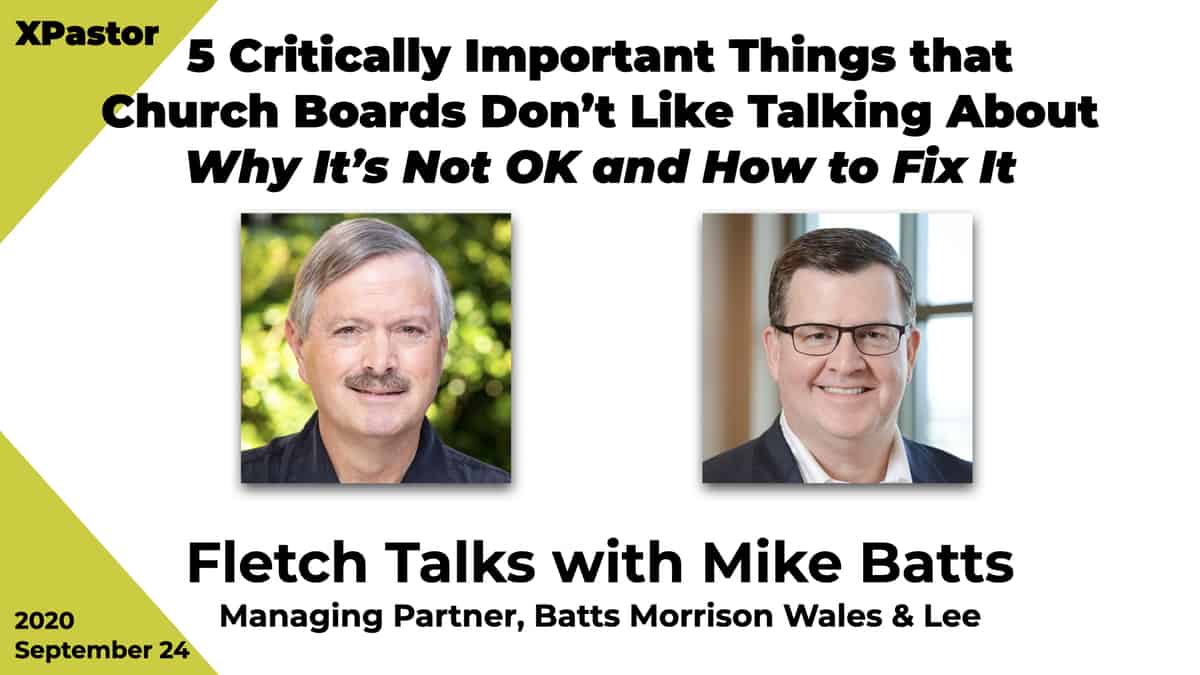XPastor tries to help churches by providing some of the essentials for running a church—items like job descriptions, employment applications, review forms and policies. Below are the amended Church By-Laws of Cibolo Creek Community Church of Fair Oaks Ranch, Texas.
Article I—Name and Principal Office
The name of the Corporation is Cibolo Creek Community Church, Inc. This Corporation will be further referred to in the Bylaws as the “Church” or “Cibolo Creek Community Church.” The Church maintains its principal office at 8000 Fair Oaks Parkway, Suite 211, Fair Oaks Ranch, Texas. The Elders and Board of Trustees of the Church together combined shall have full power and authority to change the principal office from one location to another.
Article II—Vision and Mission
The Vision of Cibolo Creek Community Church is to become a biblically functioning community of fully devoted followers of Jesus Christ where God’s redemptive purposes can be accomplished in our world.
The Mission of Cibolo Creek Community Church is to turn unchurched people into fully devoted followers of Jesus Christ.
Article III—Purpose
The Purpose of Cibolo Creek Community Church is to help people discover a personal relationship with Jesus Christ, to nurture them to Christlike maturity within an authentic Christian community, and to equip them to use their God-given abilities to make a difference in their world for the Kingdom of God.
Article IV—Affiliation
This Church is autonomous and maintains the right to govern its own affairs, independent of any denominational control.
Article V—Membership
Section I: General
Membership in this Church shall consist of all persons who have met the qualifications for membership and are listed in the Membership Directory. Those persons shall be referred to as “Members.”
Section II: Qualifications for Membership
- A personal commitment of faith in Jesus Christ for salvation.
- Active participation in the Church’s membership process.
- 3. A signed written affirmation to abide by the Cibolo Creek Community Church’s Membership Covenant, upon completion of the Church’s membership process.
Section III: Designation of Membership
In an effort to properly reflect the membership of the Church, a Membership Directory shall be maintained and updated periodically.
Section IV: Responsibilities of Membership
The responsibilities of membership are described in the Membership Covenant.
Section V: Affirmation Rights of Membership
Subject to the following, every Member shall have the right to approve or disapprove the following matters:
- The annual operating and capital budget of the Church.
- The disposition of all or substantially all of the assets of the Church.
- The merger or dissolution of the Church.
- Amendments to the Articles of Incorporation or Bylaws of the Church.
- The affirmation or declination of individual candidates for the Board of Trustees.
- Calling or removing of a Senior Pastor.
Each Member sixteen (16) years of age and older is entitled to one vote. A Member must be present at any membership meeting in order to exercise the Member’s right to vote. Voting by proxy or by mail is prohibited.
Section VI: Termination of Membership
Members shall be removed from the Church’s membership for the following reasons:
- Death.
- Transfer of membership to another church.
- By personal request of the Member.
- Dismissal by a unanimous vote of the Elders according to the following conditions:If a Member is not living his or her life in accordance with the Membership Covenant and as such the Member is hindering the ministry life of the Church or its witness in the community.
Section VII: Restoration of Membership
Members dismissed by the Elders shall be restored by the Elders when their life-styles are judged to be in accordance with the Membership Covenant.
Article VI—Membership Meetings
Section I: Place
Meetings of the Members shall be held at places within or outside Texas designated, from time to time, by the Elders.
Section II: Annual Meeting
An Annual meeting of the Members shall be held in November of each year at such time as determined by the Elders. The purpose of this meeting shall include an adoption of an annual budget and to affirm the individual candidates that have been recommended by the Elders for the Board of Trustees. Subject to Section IV of this Article, any other proper business may be conducted at this meeting.
Section III: Special Meetings
Special meetings may be called at any time by the Elders for any purpose by giving notice to the Members in accordance with Section IV of this Article.
Section IV: Notice Requirements for Membership Meetings
- General Requirements. Whenever Members are required or permitted to take any action at a meeting, notice shall be given to members no less than two (2) weeks prior to that meeting. Notification of membership meetings shall be given in any of the following manners, which shall be deemed to be a reasonable method of calling a membership meeting:
- Distribution of written material to the Members in attendance at any regularly scheduled service.
- Announcement of the meeting in the Church’s monthly newsletter.
- Oral announcement to the Members in attendance at any regularly scheduled service.
- Delivery by United States mail to each Member identified in the Membership Directory.
- Notice of Certain Agenda Items. Approval by the Members of any of the following agenda items, other than by unanimous approval by those Members entitled to vote, is valid only if the notice or waiver of notice specifies the general nature of the agenda item:
- Calling or removing the Senior Pastor.
- Amending the Articles of Incorporation.
- Adopting, amending or repealing Bylaws.
- Disposing of all or substantially all of the Church’s assets.
- Adopting or amending a merger agreement.
- Approving the election to dissolve the Church.
Section V: Quorum
Those Members present at a meeting duly noticed and called shall constitute a quorum of the membership for transacting any business of the Church.
Article VII—Board of Trustees
Section I: Number and Term
The Elders shall, from time to time, designate the authorized number of Trustees of the Church, provided that such number shall be no less than three (3), and no more than fifteen (15). The Trustees shall be affirmed individually by the Members at a duly noticed and called membership meeting only after each individual candidate has been tested and recommended by the Elders. Each Trustee may serve successive one (1) year terms or until earlier resignation or removal. Each Trustee who is to serve a successive one (1) year term must be reexamined and recommended to the Members by the Elders.
Section II: Removal of a Trustee
The Trustees may only be removed by a majority vote of all of the Elders.
Section III: Trustee’s Stewardships
The Board of Trustees shall have the following spiritual stewardships of the Church’s resources in the following areas in accordance with the Church’s Vision, Mission and Purpose:
- Stewardship of legal responsibilities.
- Stewardship of financial resources.
- Stewardship of physical resources.
- Stewardship of human resources.
Section IV: Meetings of the Board of Trustees
Regular or special meetings of the Board of Trustees may be held at any place within or outside the State of Texas that has been designated from time to time by resolution of the Board of Trustees. In the absence of such designation, meetings shall be held at the principal office of the Church. Notwithstanding the above provisions of this section, a regular or special meeting of the Board of Trustees may be held at any place consented to by all of the Trustees, either before or after the meeting. If such consents are given, they shall be filed with the minutes of the meeting. Any meeting, regular or special, may be held by conference telephone or similar communications equipment, as long as all Trustees participating in the meeting can hear one another. All such Trustees shall be deemed to be present in person at such meeting. Meetings of the Board of Trustees are generally open to the Members; however, the Trustees may elect to close a meeting in order to address an issue(s). Regular and special meeting times, dates and locations will be clearly posted in the Church office for viewing by Members during regular office hours.
Section V: Regular Meetings
Regular meetings of the Board of Trustees may be held without notice to the Trustees if the time and place of such meetings are fixed by resolution of the Board of Trustees.
Section VI: Special Meetings
- Authority to Call. Special meetings of the Board of Trustees may be called for any purpose and at any time by the Board of Trustees.
- Notice.
- Manner of Giving Notice. Notice of the time and place of special meetings shall be given to each Trustee by one of the following methods: (1) by personal delivery of written notice; (2) by first class mail, postage prepaid; (3) by telephone communication, either directly to the Trustee or to a person at the Trustee’s office or home who the person giving the notice has reason to believe will promptly communicate the notice to the Trustee; or (4) by email or facsimile to the Trustee’s home or office.
- Time Requirements. Notices sent by first class mail shall be deposited in the United States mail at least four (4) days before the time set for the meeting. Notices given by personal delivery, telephone, email, facsimile or telegraph shall be hand delivered, telephoned or faxed to the Trustee or given to the telegraph company at least twenty-four (24) hours before the time set for the meeting.
- Notice Contents. The notice shall state the time and place for the meeting. However, the notice does not need to specify the place of the meeting if the special meeting is to be held at the Church’s principal office. The notice does not need to specify the purpose of the meeting.
Section VII: Quorum
A majority of the Church’s Board of Trustees (example: a minimum of three of five) are required to be present and voting at a meeting duly called and noticed and thus shall constitute a quorum for the transaction of business. Every action taken or decision made by a majority of the Board of Trustees present at a meeting duly held at which a quorum is present shall be the act of the Board of Trustees, subject to the provisions of the Texas Non-Profit Corporation Act. A meeting at which a quorum is initially present may continue to transact business, not withstanding the subsequent withdrawal from that meeting of a Trustee(s).
Section VIII: Waiver of Notice
The transactions of any meeting of the Board of Trustees, however called and noticed or wherever held, shall be as valid as though taken at a meeting duly held after regular call and notice, if a quorum is present, and either before or after the meeting, each of the Board of Trustees not present signs a written waiver of notice, a consent to holding the meeting, or approves the minutes. The waiver of notice or consent need not specify the purpose of the meeting. All waivers, consents and approvals shall be filed with the corporate records or made a part of the minutes of the meeting. Notice of a meeting need not be given to any Trustee who attends the meeting without protesting before or at its commencement about the lack of notice.
Section IX: Action Without Meeting
Any action required or permitted to be taken by the Board of Trustees may be taken without a meeting if all of the Trustees, individually or collectively, consent in writing to the action. Such action by written consent shall have the same force and effect as the unanimous vote of the Board of Trustees. Such written consent or consents shall be filed with the minutes of the proceedings of the Board of Trustees.
Article VIII—Elders
Section I: Number and Term
The authorized number of Elders shall be such number as may from time to time be authorized by resolution of the Elders, provided that such number shall not be less than four (4) nor more than fifteen (15). Subject to the above, the Elders shall have the sole responsibility of selecting who may serve as an Elder. Each Elder may serve successive one (1) year terms or until earlier resignation or removal.
Section II: Removal of an Elder
An Elder may only be removed by a majority vote of all of the Elders, excluding the vote of the Elder being voted on for removal.
Section III: Oversight and Powers
- Spiritual Oversight. The Elders shall have the following spiritual oversight responsibilities in the following areas, in accordance with the Church’s vision, mission and purpose:
- Visionary Oversight. The Elders shall ensure the Church’s commitment to its stated vision, mission and purpose.
- Pastoral Oversight. The Elders shall ensure the effective care of the Church family through the on-going approval and evaluation of key staff members, lay-leaders and ministry programs.
- Theological Oversight. The Elders shall ensure the biblical accuracy of teaching and materials provided to our congregation throughout the ministry of the Church.
- Moral Oversight. The Elders shall ensure the health and integrity of our Church’s reputation through the loving and supportive admonition of conduct unbecoming of a Member.
- Relational Oversight. The Elders shall encourage the reconciliation of conflict between Members through loving support and accountability of all parties involved.
- General Corporate Powers. Subject to the provisions and limitations of the Texas Non-Profit Corporation Act and any limitations in the Articles of Incorporation and these First Amended Bylaws, the activities, business affairs of the Church shall be conducted and all corporate powers shall be exercised by or under the direction of the Elders.
- Specific Powers. Without prejudice to the general powers set forth above, and subject to same limitations, the Elders shall have the power to:
- Select the Vice President and Treasurer, if applicable, and the Secretary of the Corporation and remove all officers, Agents and employees of the Church except for the Senior Pastor; prescribe any powers and duties for them that are consistent with any applicable state or federal laws, with the Articles of Incorporation and with these First Amended Bylaws.
- Adopt, make and use a corporate seal and alter the form of the seal.
- Borrow money and incur indebtedness on behalf of the Church and cause to be executed and delivered for the Church’s purposes and in the Church’s name, promissory notes and other evidences of debt and securities.
- Exercise all other powers conferred by the Texas Non-Profit Corporation Act or other applicable state or federal laws.
Section IV: Meetings of the Elders
Regular or special meetings of the Elders may be held at any place within or outside the State of Texas that has been designated from time to time by resolution of the Elders. In the absence of such designation, meetings shall be held at the principal office of the Church. Notwithstanding the above provisions of this section, a regular or special meeting of the Elders may be held at any place consented to in writing by all of the Elders, either before or after the meeting. If such consents are given, they shall be filed with the minutes of the meeting. Any meeting, regular or special, may be held by conference telephone or similar communications equipment, as long as all Elders participating in the meeting can hear one another. All such Elders shall be deemed to be present in person at such meeting. Meetings of the Elders are generally open to the Members; however, the Elders may elect to close a meeting in order to address an issue(s). Regular and special meeting times, dates and locations will be clearly posted in the Church office for viewing by Members during regular office hours.
Section V: Regular Meetings
Regular meetings of the Elders may be held without notice to the Elders if the time and place of such meetings are fixed by resolution of the Elders.
Section VI: Special Meetings
- Authority to Call. Special meetings of the Elders may be called for any purpose and at any time by the Senior Pastor or any other Elder.
- Notice.
- Manner of Giving. Notice of the time and place of special meetings shall be given to each Elder by one of the following methods: (1) by personal delivery of written notice; (2) by first class mail, postage prepaid; (3) by telephone communication, either directly to the Elder or to a person at the Elder’s office or home who the person giving the notice has reason to believe will promptly communicate the notice to the Elder; or (4) by email or facsimile to the Elder’s home or office.
- Time Requirements. Notices sent by first class mail shall be deposited in the United States mail at least four (4) days before the time set for the meeting. Notices given by personal delivery, telephone, email or facsimile or telegraph shall be hand delivered, telephoned or faxed to the Elder, or given to the telegraph company at least twenty-four (24) hours before the time set for the meeting.
- Notice Contents. The notice shall state the time and place for the meeting. However, the notice does not need to specify the place of the meeting if the special meeting is to be held at the Church’s principal office. The notice does not need to specify the purpose of the meeting.
Section VII: Quorum
A majority of all the Elders (example: a minimum of three of five) are required to be present and voting at a meeting duly called and noticed and thus shall constitute a quorum for the transaction of business. Every action taken or decision made by a majority of the Elders present at a meeting duly held at which a quorum is present shall be the act of the Elders, subject to the provisions of the Texas Non-Profit Corporation Act. A meeting at which a quorum is initially present may continue to transact business, not withstanding the subsequent withdrawal from that meeting of an Elder(s).
Section VIII: Waiver of Notice
The transactions of any meeting of the Elders, however called and noticed or wherever held, shall be as valid as though taken at a meeting duly held after regular call and notice, if a quorum is present, and either before or after the meeting, each of the Elders not present signs a written waiver of notice, a consent to holding the meeting, or approves the minutes. The waiver of notice or consent need not specify the purpose of the meeting. All waivers, consents and approvals shall be filed with the corporate records or made a part of the minutes of the meeting. Notice of a meeting need not be given to any Elder who attends the meeting without protesting before or at its commencement about the lack of notice.
Section IX: Action Without Meeting
Any action required or permitted to be taken by the Elders may be taken without a meeting, if all of the Elders, individually or collectively, consent in writing to the action. Such action by written consent shall have the same force and effect as the unanimous vote of the Elders. Such written consent or consents shall be filed with the minutes of the proceedings of the Elders.
Article IX—Corporate Officers
Section I: Designation of Officers
The Officers of the Church shall be President, Vice President and Treasurer, and Secretary. The Senior Pastor shall serve as the President of the Church and shall act as the moderator of the Church. The Executive Pastor, if applicable, shall serve as the Vice President and Treasurer of the Church and shall act as the moderator of the Church in the absence of the President. In the absence of an Executive Pastor, the Elders shall select an Elder to serve as Vice President and Treasurer. The Secretary of the Church shall be an Elder, and shall be selected by the Elders. The Secretary of the Church shall act as moderator in the absence of both the President, Vice President and Treasurer.
Section II: Election of Officers
The Senior Pastor of the Church shall be chosen by the Members at a membership meeting. All other corporate officers of the Church shall be chosen by the Elders, and each shall serve at the discretion of the Elders, subject to the rights, if any, of an officer under any contract of employment, if any.
Section III: Removal of Officers
The Senior Pastor may only be removed by the Members of the Church at any duly called and noticed membership meeting. Subject to the rights, if any, of any other officer under any contract of employment, all other officers may be removed, with or without cause, by the Elders, at any duly called and noticed meeting of the Elders, by a majority vote of all the Elders, excluding the vote of the officer being voted on by the Elders.
Section IV: Vacancies in Offices
A vacancy in any office because of death, resignation, removal, disqualification or any other cause shall be filled only in the manner prescribed in Section II above for regular appointments to that specific office. Such vacancies shall be filled as they occur.
Article X—Indemnification of Elders, Directors, Officers, Trustees, Employees and Other Agents
Section I: Definitions
For the purpose of this Article,
- Agent. “Agent” means any person who is or was an Elder, Director, Officer, Trustee, Employee, Volunteer or other designated Agent of the Church, or is or was serving at the request of the Church as an Elder, Director, Officer, Trustee, Employee, Volunteer or other designated Agent of another foreign or domestic corporation, partnership, joint venture, trust or other enterprise, or was an Elder, Director, Officer, Employee or other Agent of a foreign or domestic corporation that was a predecessor corporation of the Church or of another enterprise at the request of such predecessor corporation.
- Proceeding. “Proceeding” means any threatened, pending or completed action or proceeding, whether civil, criminal, administrative or investigative.
- Expenses. “Expenses” include, without limitation, all attorneys’ fees and any other expenses incurred in the defense of any claims or proceedings against an Agent by reason of his position or relationship as Agent and all attorneys’ fees, costs, and other expenses incurred in establishing a right to indemnification under this Article.
Section II: Indemnification
The Church shall indemnify and hold harmless any Agent upon all suits, actions, lawsuits, damages, claims or liabilities of any character, type or description, including without limiting the generality of the foregoing, all expenses of litigation, court costs and attorneys fees for injury to any person, or injury to any property, received or sustained by any person or property arising out of or occasioned by the Agent’s acts or omissions on behalf of the Church. This indemnity shall not extend to any Agent who has committed acts or omissions which are grossly negligent, reckless or intentionally tortious. This indemnity shall not extend to any claim made against the Agent by the Church or individual or entity acting on behalf of the Church.
Section III: Limitations
No indemnification or advance shall be made under this Article, except as provided in Section II, in any circumstances when it appears:
- That the indemnification or advance would be inconsistent with a provision of the Articles of Incorporation, the Bylaws, a resolution of the Members, or an agreement in effect at the time of the accrual of the alleged cause of action asserted in the proceeding in which the expenses were incurred or other amounts were paid, which prohibits or otherwise limits indemnification.
- That the indemnification would be inconsistent with any condition expressly imposed by a court in approving a settlement.
Section IV: Insurance
The Elders may adopt a resolution authorizing the purchase and maintenance of insurance on behalf of any Agent of the Church against any liability asserted against or incurred by the Agent in such capacity or arising out of the Agent’s status as such, whether or not the Church would have the power to indemnify the Agent.
Article XI—Records and Reports
The Church shall maintain the following records and reports:
- Adequate and correct books and records of accounts (financial records).
- All required corporate records including, but not limited to, written minutes of the proceedings of the Elders and Board of Trustee meetings.
- In accordance with Article V, a record of the Members of the Church, setting forth the Members’ names, addresses and phone numbers.
All such records shall be kept at the Church’s principal office.
Article XII—Construction and Definitions
Unless the context requires otherwise, the general provisions, rules of construction, and definitions in the Texas Non-Profit Corporation Act shall govern the construction of these First Amended Bylaws.
Article XIII—Amendments to the Bylaws
Subject to the provisions of the Texas Non-profit Corporation Act, these First Amended Bylaws or any provision of them may be altered, amended or repealed, and new Bylaws may be adopted by vote of two-thirds of the Members present at any duly called and noticed membership meeting.
Certificate of Secretary
I, the undersigned, certify that I am the presently elected and acting Secretary of the Cibolo Creek Community Church, a Texas Non-Profit Corporation, and that these First Amended Bylaws, consisting of sixteen (16) pages including this page, are the Bylaws of this Church as approved and adopted by the Members of the Church on November 10, 2002.
Executed at Fair Oaks Ranch, Texas, this 10th day of November, 2002.
___________________________________
Danny Johnson,
Secretary
View the original PDF: Church Bylaws











